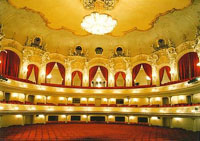Berlin opera re-stages Mozart work dropped over security fears
Under heavy security, a controversial production of Mozart's opera "Idomeneo," dropped for fear of Muslim backlash over a scene with the severed head of the Prophet Muhammad, has returned to the stage without incident.

A powerful male voice called out "stop it!" and "boo!" as the heads of Islam's founder, along with those of Jesus, Buddha and Poseidon, the Greek god of the seas, came tumbling out of a sack hefted by Idomeneo.
But several voices from the other side of the hall yelled, "continue, continue," their cheers clashing with the voice of the critic, and the cast and orchestra received prolonged applause Monday.
The reactions were somewhat anticlimactic. Plainsclothes security personnel lined the hall throughout the performance and audience members had to pass through metal detectors out of fears that the severed-heads scene could arouse unrest. Officials said 100 police officers were on duty.
The precautions delayed the raising of the opening curtain by a half an hour, as people filtered into the 1,863-seat hall of the Deutsche Oper, which was about 100 seats short of being sold out.
Some people wondered what the fuss was all about.
Opera buff Christe Gruenheid, 69, said she had seen the production nine times already and did not care about the controversy that erupted when the opera's November performances were canceled because of vague security warnings, then brought back after protests that the opera management had failed to defend artistic freedom.
"I'm only here because of the music," Gruenheid said. "The whole commotion leaves me cold."
The scene that started all the trouble is the creation not of Mozart but of director Hans Neuenfels, who called it his personal protest against all organized religion.
The production is three years old, and when it premiered then the severed heads aroused little attention outside the opera world.
But that was before a Danish newspaper published cartoons of Muhammad that led to Muslim riots worldwide - and before comments by German-born Pope Benedict XVI further inflamed sensibilities in the Islamic world, just as the Neuenfels production was to be revived.
Such fears initially led the opera house to cancel plans to revive the opera in November. Opera manager Kirsten Harms said in September that her decision was prompted by the advice of Berlin police and she invoked the "consequences of the conflict over the (Muhammad) caricatures."
The decision was roundly condemned, with Chancellor Angela Merkel warning against "self-censorship out of fear," and Interior Minister Wolfgang Schaeuble - the country's top security official - describing it as "crazy."
So the production was re-staged - with four new heads, after the original props were stolen or misplaced.
Among the audience was Danish tourist Benta Kjoeller, who said that - after the turmoil caused by the Muhammad cartoon in her homeland she had expected "something more controversial."
"I liked the opera and its message," she told the AP after the performance.
Police said they were trying to keep the security as unobtrusive as possible, though it was hard to miss the metal detectors and the X-ray bag check.
"We are ready for any eventuality," police spokesman Berhard Schodrowski said.
Schaeuble attended after inviting Muslim leaders to join him and six representatives of Islamic organizations said they would attend. But Ali Kizilkaya, head of Germany's Islamic Council, said he wouldn't be one of them.
Instead of an opera where Muhammad and Christ are beheaded, "I ... would hope for a debate in society about whether everything should be allowed for the sake of art," he said, in indirect criticism of the decision to stage the production.
Another German Muslim leader, Aiman Mazyek, also said he would miss the performance, saying the purpose of opera was "not to mix religion, art and politics."
Director Neuenfels also said he would stay away, having harshly criticized the present Deutsche Oper management's revivals of his productions. He insisted his staging not be altered, saying the scene where the king of Crete presents the severed heads represents his protest against "any form of organized religion or its founders."
Subscribe to Pravda.Ru Telegram channel, Facebook, RSS!


